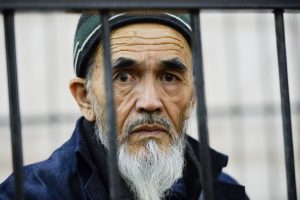Azimjon Askarov was sentenced to life in prison in 2010 after more than a dozen police officers testified against him, claiming he’d participated in the murder of another officer during the violence and unrest in southern Kyrgyzstan that spring. Askarov had made it his life’s work — as a journalist and activist — to investigate and document police abuses and prison conditions and in the end, he was a victim of the same.
On July 24, 2020 Askarov’s lawyer told the media his client was pale, coughing, and unable to walk without assistance. Askarov’s supporters and family have long argued he was not in good health, but the present coronavirus pandemic spinning out of control in the region added extra weight to their concerns.
The State Penitentiary Service replied to inquiries by commenting that Askarov was in “good health.” According to Kloop’s reporting, the service dismissed any information otherwise as unreliable.
On Friday, July 25, at the age of 69, Askarov died in prison of pneumonia. The prison authorities went so far as to claim that he pulled off his own oxygen concentrator before dying.
Over the weekend, Askarov’s friends and family mourned; activists, diplomats, and journalists who have long watched his case reflected. There have been calls for an investigation. Eurasianet’s obituary is well worth reading, as are statements put out by Mary Lawlor, the UN Special Rapporteur on the situation of human rights defenders; the Committee to Protect Journalists; and Human Rights Watch.
What little I have to add is framed by where I sit in Washington, D.C., less than three miles from “Black Lives Matter Plaza.” The intersection just north of the White House was renamed earlier this summer by the city’s leaders in support of the Black Lives Matter movement in the wake of protests that erupted across the country following the murder of a Black man, George Floyd, by police in Minneapolis, Minnesota.
While this moment in the United States is flavored by national history — colonialism, slavery, racism, and white supremacy — it touches on universal sins, too: the abuse of power and exactly whom power abuses.
In Kyrgyzstan, power abuses people like Askarov, but lets Chechen gangsters slip out of prison and skip away. Power persecutes and prosecutes presidents, but only when convenient for their successors to consolidate power.
Askarov was an ethnic Uzbek, a minority in Kyrgyzstan concentrated in the country’s south. The 2010 violence, which dovetailed with the second revolution, was largely a battle along ethnic lines. Most of the dead were Uzbek; most of those arrested for the violence were Uzbek, too.
I first wrote about Askarov for The Diplomat in 2015 when the U.S. State Department’s Bureau of Democracy, Human Rights, and Labor announced that Askarov was a recipient of its 2014 Human Rights Defenders Award. Bishkek pitched a fit, scrapping a 1993 treaty with the United States that facilitated the provision of aid to the post-Soviet country.
The next year, the UN Human Rights Committee found that Askarov “had been arbitrarily detained, held in inhumane conditions, tortured and mistreated, and prevented from adequately preparing his trial defense.” Askarov was not freed, but was granted a new trial.
Meanwhile, Kyrgyz authorities — with President Almazbek Atambayev then at the helm — moved to change the stipulation in the country’s constitution that enabled Kyrgyz to seek redress for human rights violations in international bodies and obligated the Kyrgyz state to respect those decisions. In a referendum, the change was soundly approved.
Askarov’s new trial ended in early 2017 with a guilty verdict, again. As Askarov and his supporters pursued every opportunity for appeal, the Kyrgyz government remained steadfast in its determination to never led Askarov go. His final appeal was dismissed this past May.
In a 2018 interview with Eurasianet, Roza Otunbayeva, who had been interim president at the time, hid behind the Kyrgyz court decisions. Regarding her power to pardon him, she said that such a decision would have broken the country.
Askarov’s case was always seen as “sensitive.” A Kyrgyz interlocutor once remarked to me that he was just one man — why so much agitation? I didn’t know quite what to say then, but I do know what to say now: That one man’s story illustrates just how broken the entire system is.
Kyrgyzstan’s health care system is buckling under the weight of a dramatic influx of coronavirus and pneumonia cases — prison populations are especially vulnerable because of crowded conditions and frankly a lack of caring for the wellbeing of “convicts” on the part of the authorities. Kyrgyzstan’s legal system is working on finishing a second trial of former President Atambayev (who was transferred back to a detention center in early July after being hospitalized for pneumonia) and finding new ways to avoid seriously looking into the corruption exposed by journalists last year in an investigative report that cost one source his life. The state continues to dismiss critiques in the press as fake news, “unreliable information” just like the news that Askarov was ill. And Kyrgyzstan’s politicians, fearful for their positions, remain morally weak lest they end up on the wrong side.
Right now, Kyrgyzstan is a broken country and Askarov is dead, having never again tasted freedom.

































